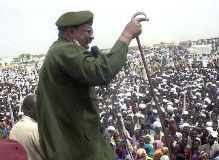Sudan’s Bashir urges peace in troubled Darfur
July 21, 2007 (NYALA, Sudan) — Sudanese President Omar al-Beshir launched a call for peace on Saturday during a rare visit to war-torn Darfur intended to show Khartoum’s desire to develop the arid desert region.
 Speaking to a gathering in the capital of south Darfur Nyala, 600 miles southwest of the capital Khartoum, Beshir called on non signatory rebels to join May 2006 deal. “The citizens just want a comprehensive peace followed by development,” Beshir said. “That is why I call on the armed rebels to join the political process so that together we can reconstruct Darfur.”
Speaking to a gathering in the capital of south Darfur Nyala, 600 miles southwest of the capital Khartoum, Beshir called on non signatory rebels to join May 2006 deal. “The citizens just want a comprehensive peace followed by development,” Beshir said. “That is why I call on the armed rebels to join the political process so that together we can reconstruct Darfur.”
During his three-day visit Beshir is due to inaugurate several projects including new roads and hospitals, in the three states of Darfur.
The visit is part of the hardline leader’s attempt to recast himself in the role of unifier. He is scheduled to visit Darfur’s three provincial capitals in as many days.
Al-Bashir urged “those still in the bushes” — an apparent reference to rebel fighters — to return home and join the peace process. He promised they would be compensated for losses incurred during the conflict.
“If you preserve the current peace and security … we will shoulder the responsibility of development and see to it that you get compensation,” he added. “We want the displaced persons to return to their home areas and cultivate the land.”
Al-Bashir pledged not to allow any infringement on Sudan’s unity and independence. He said only those who want to help are welcome — not those seeking to “colonize us,” invoking historical battles against British colonial rule.
On Sunday, he will chair an extraordinary cabinet meeting in Al-Fasher, the capital of north Darfur, to discuss developing the region which is devoid of infrastructure.
“Darfur problem now is the existence of IDPs camps which become a sort of exhibition, a show for people from everywhere,” al-Beshir said this evening in El-Fasher during a meeting with the representative of IDPs, the official SUNA reported.
Khartoum has repeatedly accused Western media of exaggerating the scale of the four-year conflict which has killed at least 200,000 people and forced two million from their homes, according to UN figures.
The government has accepted the planned deployment of a joint United Nations-African Union peacekeeping force to replace an under-funded and ill-equipped AU force currently operating there.
Al-Bashir’s government is accused of having responded with indiscriminate killings by unleashing the janjaweed militias of Arab nomads, blamed for the worst atrocities in Darfur. The U.S. has condemned the killing as a genocide. The government denies the charges.
Under heavy pressure from the United Nations, al-Bashir recently agreed to allow the deployment of 3,000 U.N. peacekeepers in Darfur to support 7,000 poorly equipped and underfunded African Union troops already there.
Accompanied by his ministers, al-Bashir was to also visit El Fasher, capital of North Darfur, where a Cabinet meeting will be held Sunday. On Monday, he is to fly to El Geneina, the capital of West Darfur, before returning to Khartoum the same day.
In Nyala, al-Bashir criticized those trying to divide the citizens of Darfur as Arabs and Africans.
“This is but a plot that seeks to divide people as Arabs and (Zorgah) blacks,” he said. “Those who make such distinction seek sedition and plotting, do not listen to them.”
Just two weeks ago, the U.S. envoy to Sudan Andrew Natsios accused al-Bashir’s government of resuming bombing of civilians in Darfur and warned of a “disturbing” trend of Arab groups resettling in the area. His comments in Khartoum followed what he said was a resumption of attacks in Darfur after a lull of several months.
The civil war erupted in 2003 when Darfur rebel groups launched a rebellion against the Sudanese government.
In May 2006, a peace deal was signed at Abuja in Nigeria between Khartoum and only one of three negotiating rebel factions.
Efforts to end the conflict were revived on Monday during a meeting in Libya aimed at paving the way for new talks between the Sudanese government and fragmented non-signatory rebel groups.
(AFP/AP/ST)
